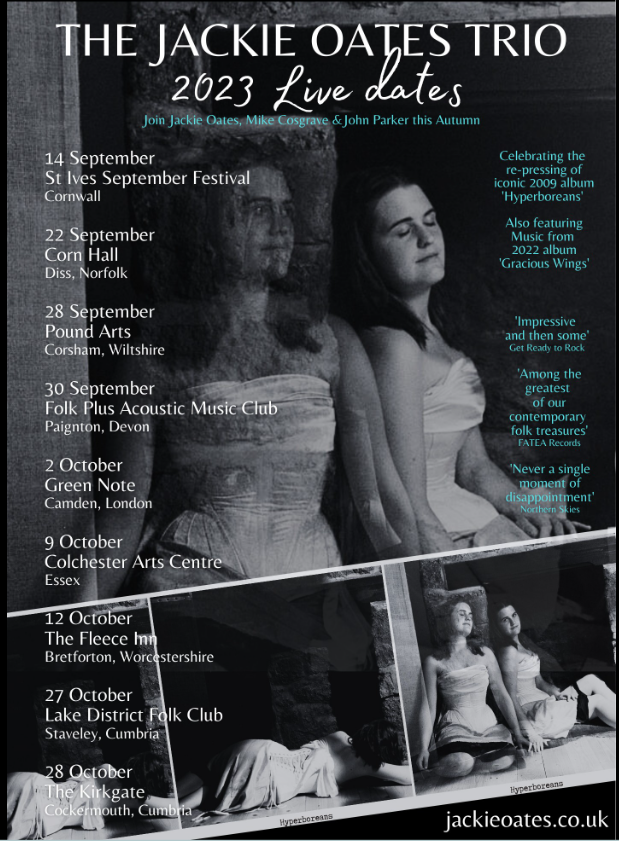With Revisted, we highlight an album from the past to bring it to light again. Why do it? Due to the march of time, that album will be new to many, and we seem to live in a world of not just fast fashion but also fast music, where an album is no sooner released than forgotten in a year or two because of the way that many now listen to music.
“It’s hard to imagine a voice more suited to lullabies than the clear, gentle tones of Jackie Oates.” Those were the words of our reviewer Johnny Whalley writing about Jackie Oates’ album Lullabies, released on 18 March 2013. Johnny began his review:
It’s easy enough to waste hours arguing over what is or isn’t folk music, and even putting the word ‘traditional’ in front doesn’t necessarily stop the debate. But songs that have been passed down, orally, from generation to generation, are pretty much a shoo-in, and many lullabies certainly meet that criterion. So, it’s surprising that, as Jackie points out, “They have been tucked away in song collections, manuscripts and memories and given little real status in the traditional song repertoire.” She has been hunting down these songs for the past 18 months, and, as well as this CD, her project will result in a lullaby archive being established in the library at Cecil Sharp House.
We all know what lullabies are; quiet, soothing songs to lull young children to sleep. You’ll perhaps have a re-think when you hear some of the songs assembled for this collection. True, the majority have the gentle, calming tone you’d expect, but, so often, the lyrics tell a very different story. As Jackie puts it, “Through these unique songs children often uncomprehendingly become a parent’s confidant, hearing of the joys, grievances and anxieties of the adult world. At other times they are moral tales, bribes for good behaviour or spells to comfort.”
When Jackie released this album, her album tour had an interesting twist, with each evening performance supported by afternoon lullaby workshops for those up to the age of 4.
I was reminded of this album recently when Abigail Lapell announced her own lullaby album, also titled Lullabies, which features songs sung in English, French, Hebrew, Spanish, Yiddish, German, Japanese and Welsh.
Jackie’s album was also far-reaching, as Johnny wrote:
In addition to her trawl through the British and Irish cannon, Jackie has looked further afield, particularly to the Scandinavian repertoire, and two tracks feature Icelandic singer, Bara Grimsdottir. These tracks nicely illustrate both the ambiguity and the dreadful warnings that lullabies can contain. Bi Bi Og Blaka, sung first in Icelandic by Bara and then by Jackie in English, seems innocent enough, telling of little children roaming on hills, playing with lambs. But is it referring to the practice of forcing children out onto the hills to search for lost lambs? There’s little ambiguity in Sofou unga astin min. The song warns first of some peculiarly Icelandic night terrors, “Often I saw black sand burning the green meadow. In the glacier cracks are rumbling deep as death”. Good advice to keep away from active volcanoes but the song then takes a very different theme, “Sorrow will teach you soon, while the day is quickly decaying, that men love, lose, cry and mourn.” The nights are dark in Iceland and so are the lullabies.
Johnny: The English language songs tend not to be so stark, though one of the oldest, The Wexford Lullaby, emphasises that the parent won’t always be around to protect them from the perils of the world, whilst Little Fishes advises children to learn their school lessons well if they are to survive. The opening track, Dream Angus, provides a gentle contrast with its image of Angus dashing over the heather to ensure children have dreams to see them through to morning. He does sell the dreams, though, and at what price isn’t revealed. The notion of a dream seller will always evoke Lindisfarne’s Meet Me On The Corner, that’s always seemed to be something of a druggy song to me. So maybe Angus isn’t so innocent after all.
The album featured Jackie on fiddle, Chris Sarjeant on guitar and Belinda O’Hooley on piano. At the time of the album’s release, Folk Radio still had its 24-hour radio stream, and on the lead-up to its release, we aired a special show hosted by Jackie on which she featured a series of lullabies from some of her favourite artists. You can listen to it in full below:
Playlist
Hushaby – Dalla
Little Lap Dog Lullaby – Laura Veirs
Hushabye Birdy – Emily Portman
Slumber Boats (Baby’s Boats) – Cath and Phil Tyler
The Highland Lullaby – Sandra Kerr & Friends
O Can Ye Sew Cushions – Mairi Campbell & Concerto Caledonia
Washing Song – The Imagined Village (featuring Eliza Carthy)
Minnie of Sherva’s Cradle Song – Craig, Morgan, Robson
All the Pretty Little Horses – Caroline Herring
Lova Lova Line – Kim Andre Rysstad
When Cockle Shells – The Mighty Doonans (featuring Rosie Doonan and Ben Murray)
Sandgate Wife’s Nurse Song – Dave Webber & Anni Fentiman
Griogal Cridh – Mac-Talla
Lullabye for the Times – Ewan MacColl and Peggy Seeger
Sjóferðabæn (Seafarer’s Hymn) – Bára Grímsdóttir and Chris Foster
Bya Bya – Etter Ingrid Fugelsnes
Cradle Song – Cyril Tawney
Lullaby for the Beleaguered – Mary Hampton
On Tour
Jackie tours the UK in Autumn 2023 with multi-instrumentalist Mike Cosgrave (Cosgrave & Banks, Jackie Leven, Jenny Crook) and renowned double bass player John Parker (Nizlopi, Ward & Parker).

Order Lullabies and Jackie’s other superb albums via Bandcamp: https://jackieoates.bandcamp.com/
